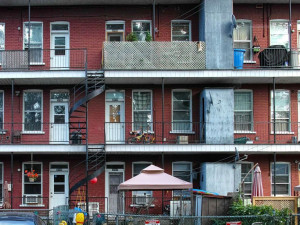
Homelessness is preventable

Responses to homelessness often revolve around temporary emergency measures: more shelter beds, shuttle services, warming centres when the weather turns cold.
These stopgaps are necessary to keep people in precarious situations from ending up on the street. When there’s a fire, you have to put it out. But if we want to end homelessness and all its terrible consequences, we need to do more. It is time to broaden our approach to homelessness to include prevention, which would involve an array of measures ranging from new laws to targeted new programs.
A heavy burden to bear
Some government agencies—prisons, hospitals, youth protection—bear a share of the responsibility for rising homelessness. They don’t ask whether people have a place to go when they leave their facilities, shifting the burden to the community sector.
Evictions are another factor. Inadequate legal protections for tenants and the lack of mechanisms to help tenants in financial or other crisis avoid eviction are another cause of homelessness. Rapidly rising rents, resulting from a variety of factors that could be addressed, also leave many households unable to pay for shelter. Tenants who are evicted from their homes must not be allowed to end up on the street or in emergency shelters.
As members of the Quebec Homelessness Prevention Policy Collaborative (Q-HPPC), we are working towards a better understanding of how homelessness can be prevented through legislative changes or new programs. It is true that such changes and programs come at short-term cost, but it is also true that preventing people from falling into chronic homelessness will help keep them healthy (as homelessness is very bad for your health) and generate significant savings in health care, emergency shelters, social services and the legal system.
We need research to develop evidence-based policies and to guide policy-making. In Quebec, there have been few studies of homelessness. We often know little about why a homelessness project or program works or doesn’t work. More research would be helpful.
We need to catch up
Experiments and research in the rest of Canada, the United States and Europe point to promising approaches. In Wales and Finland, for example, ground-breaking legislation based on the right to housing and early intervention by the state has had a dramatic impact on demand for emergency services for people experiencing homelessness. We can learn from these examples. While Quebec does have a provincial homelessness policy, we should take our cue from best practices in other jurisdictions in Canada and abroad where there is a greater focus on prevention.
A conference on homelessness prevention was just held in Montreal. Researchers, community stakeholders and representatives from various levels of government discussed “Preventing Homelessness: From Evidence to Policy.” It was an opportunity to open a dialogue with political authorities and to directly share the recommendations of academics and community organizations.
One suggestion was that Quebec adopt a homelessness prevention law that recognizes that government has an important role to play through its agencies. Preventing homelessness cannot be left mainly to community organizations. We can and must do better as a society.
Dernières nouvelles
-
 Meet Mariane Dupuis, psychosocial counsellor for the PRISM program
Meet Mariane Dupuis, psychosocial counsellor for the PRISM program -
 Will a 5.9% rent hike lead to more economic homelessness?
Will a 5.9% rent hike lead to more economic homelessness? -
 Homelessness in Montreal: Dismantling encampments isn’t the solution
Homelessness in Montreal: Dismantling encampments isn’t the solution -
 Meet Desmond Olsthoorn, Director of Emergency and Proximity Services
Meet Desmond Olsthoorn, Director of Emergency and Proximity Services -
 In the fight against homelessness, we must do more than stop people from freezing to death
In the fight against homelessness, we must do more than stop people from freezing to death - See all news